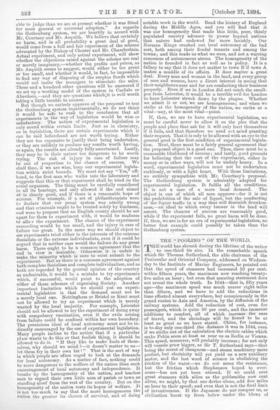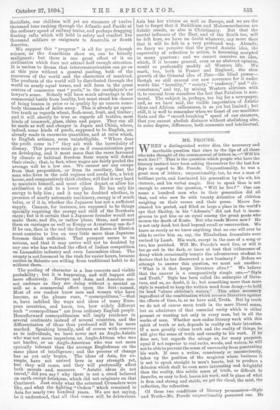THE " POOLING " OF THE WORLD. T HE world has
shrunk during the lifetime of the writer to one-third its size. In the remarkable speech which Sir Thomas Sutherland, the able chairman of the Peninsular and Oriental Company, addressed on Wednes- day to the Institute of Marine Engineers, he pointed out that the speed of steamers had increased 50 per cent. within fifteen years, the maximum now reaching twenty- five miles an hour ; but even that amazing statement does not reveal the whole truth. In 1844—that is, fifty years ago—the maximum speed was much nearer eight miles than fifteen, and we have to add the reductions in time effected almost everywhere, but conspicuously in the grand routes to Asia and America, by the diffusion of the railway systems. Add the reduction of cost, even for passengers, which is quite 30 per cent., and the immense additions to comfort, all of which increase the ease of travel, and the shrinkage will be found to be at least as great as we have stated. China, for instance, is to-day only one-third the distance it was in 1844, even if we strike out of the calculation the electric cables which make Pekin seem at least as near us as Berlin or Vienna. This speed, moreover, will probably increase; for not only will vessels grow bigger, as Sir T. Sutherland says—that being the secret of cheapness—and steam machinery more perfect, but electricity will yet yield us a new auxiliary motor, and the last word of science in abolishing the friction of the water—we do not mean the resistance, but the friction which Stephenson hoped to over- come—has not yet been uttered. If we could coat great steamers with silica as the goldsmiths now coat silver, we might, by that one device alone, add five miles an hour to their speed; and even that is not the final limit of inventiveness. If the Japanese do not conquer us, or civilisation burst up from below under the blows of Socialists, our children will yet see steamers of twelve thousand tons rushing through the Atlantic and Pacific at the ordinary speed of railway trains, and perhaps dragging floating rails which will hold in safety and comfort five thousand soldiers or emigrants to Australia or South America.
We suppose this " progress " is all for good, though science, as the Anarchists show us, can be bitterly malignant ; but there is one great effect of it on civilisation which does not attract half enough attention. It is useless to dream that intercommunication can go on at this pace without a general pooling, both of the resources of the world and the characters of mankind. The products of the world will be distributed through the world on nearly equal terms, and will form in the great centres of commerce vast "pools," in the cardplayer's or lawyer's sense. Nobody will have much advantage in the commercial battle from locality, but must stand his chance of being beaten in price or in quality by an unseen some- body thousands of miles away. This is already an opera- tive truth as regards wheat, flesh-meat, fruit, and timber ; and it will shortly be true as regards all textiles, most kinds of ironwork, glass, china and paper. They can all be made as well and cheaper in Japan and China, where, indeed, some kinds of goods, supposed to be English, are already made in enormous quantities, and at rates which, to English artisans, seem unintelligible. "Where does the profit come in ? " they ask with the incredulity of dismay. This process must go on if communication goes on developing, and it must mean that the races favoured by climate or habitual freedom from wants will defeat their rivals ; that, in fact, when wages are fairly pooled the average will be a low one. We cannot see any escape from that proposition, or from its corollary, that the man who lives in the cold regions and needs fire, a brick house, and comparatively thick clothes, will find it very hard to maintain himself, and must either depart or allow his civilisation to sink to a lower plane. He has only his energy to help him ; and it may be doubted whether, in presence of nearly automatic machinery, energy is of much value, or if it is, whether the Japanese has not a sufficient supply. Cannon, for instance, are supposed to be things specially requiring the energy and skill of the Northern races ; but is it certain that a Japanese founder would not make them, and file, or rather plane, them, and mount them on carriages as well as Krupp or Armstrong can do ? If be can, then in the end the foremen at Essen or Elswick must contrive to live on very little more than Japanese foremen think sufficient. That prospect seems to us serious, and that it may arrive will not be doubted by any one who has watched the effect of Indian competition on Lancashire industry and even Lancashire ideas. The county is not foremost in the rush for easier hours, because coolies in Salsette are willing from traditional habit to do without them.
The pooling of character is a less concrete and visible probability ; but it is happening, and will happen still more effectively. Europe and Asia and America can- not embrace as they are doing without a mental as well as a commercial effect upon the first - named. Most of our readers know men and women who have become, as the phrase runs, " cosmopolitans,"—that is, have imbibed the ways and. ideas of many Euro- pean countries, and know, too, how widely different such " cosmopolitans " are from ordinary English people. Henceforward cosmopolitanism will imply residence in several continents instead of several countries, and the differentiation of ideas thus produced will be far more marked. Speaking broadly, and of course with reserves as to individuals, we have never met an Anglo-Asiatic who was not more imperious, an Anglo-African who was not harder, or an Anglo-American who was not more cynically tolerant than the average Englishman on the same plane of intelligence ; and the process of change has as yet only begun. The ideas of Asia, for ex- ample, have not arrived here in any strength yet, but they will come, and they will profoundly affect both morals and manners. Asiatic ideas do not travel," did you say ? why there is not a creed believed on earth except fetishism, which did not originate on that Continent. Just study what the returned Crusaders were like, and what the fighting " Orders " which remained in Asia for nearly two hundred years. We are not saying, be it understood, that all that comes will be deleterious. Asia has her virtues as well as Europe, and we are the last to forget that if Buddhism and Mahommedanism are Asiatic creeds, so also is Christianity. But that the influence nfluence of the East, and of the South too, will be felt here, we have no doubt whatever, any more than that it will be felt in a very profound way. Already, we fancy we perceive that the grand Asiatic idea, the superiority of reflection to action, is becoming accepted in many quarters ; and we cannot conceive an idea, which, if it became general, even as an abstract opinion, would so profoundly modify all Western life. We mark, too, both in France and England, the slow growth of the Oriental idea of Fate—the blind power- thongh we still conceal our new reverence for it under words like "heredity," "society," "tendency," and "circumstance," and try, by mixing Western altruism with it, to conceal from ourselves the fact that Fatalism is non- moral. The subject is, perhaps, too big for a newspaper, and, as we have said, the visible importation of Asiatic ideas and. African callousness, is as yet but limited ; but still, it is well to remember when we boast of our maritime feats and the " record-breaking " speed of our steamers, that you cannot abolish distance without abolishing also, in some degree, difference, both economic and intellectual.







































 Previous page
Previous page